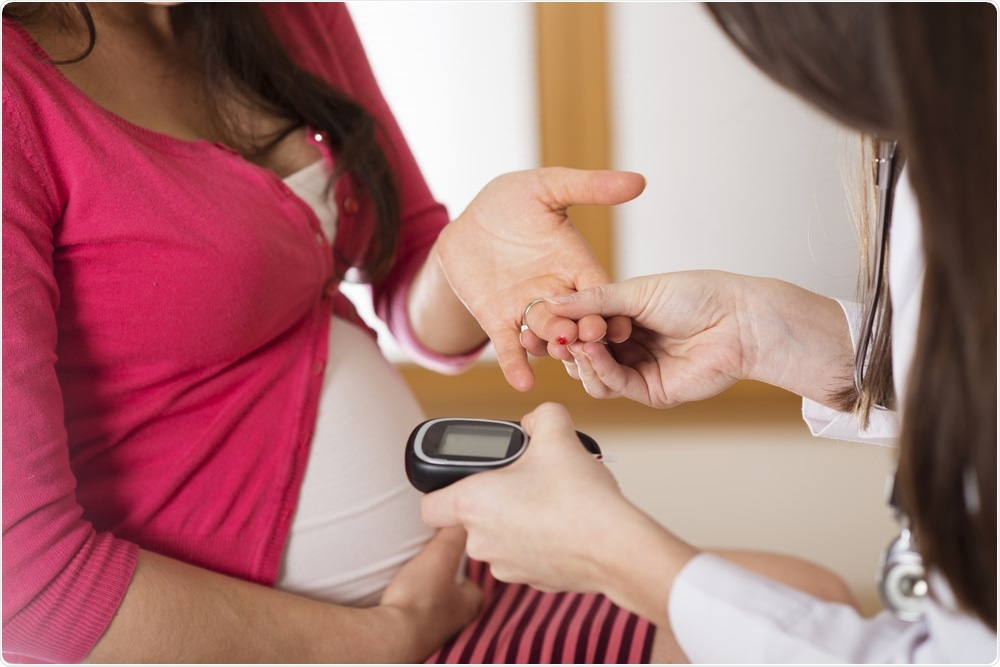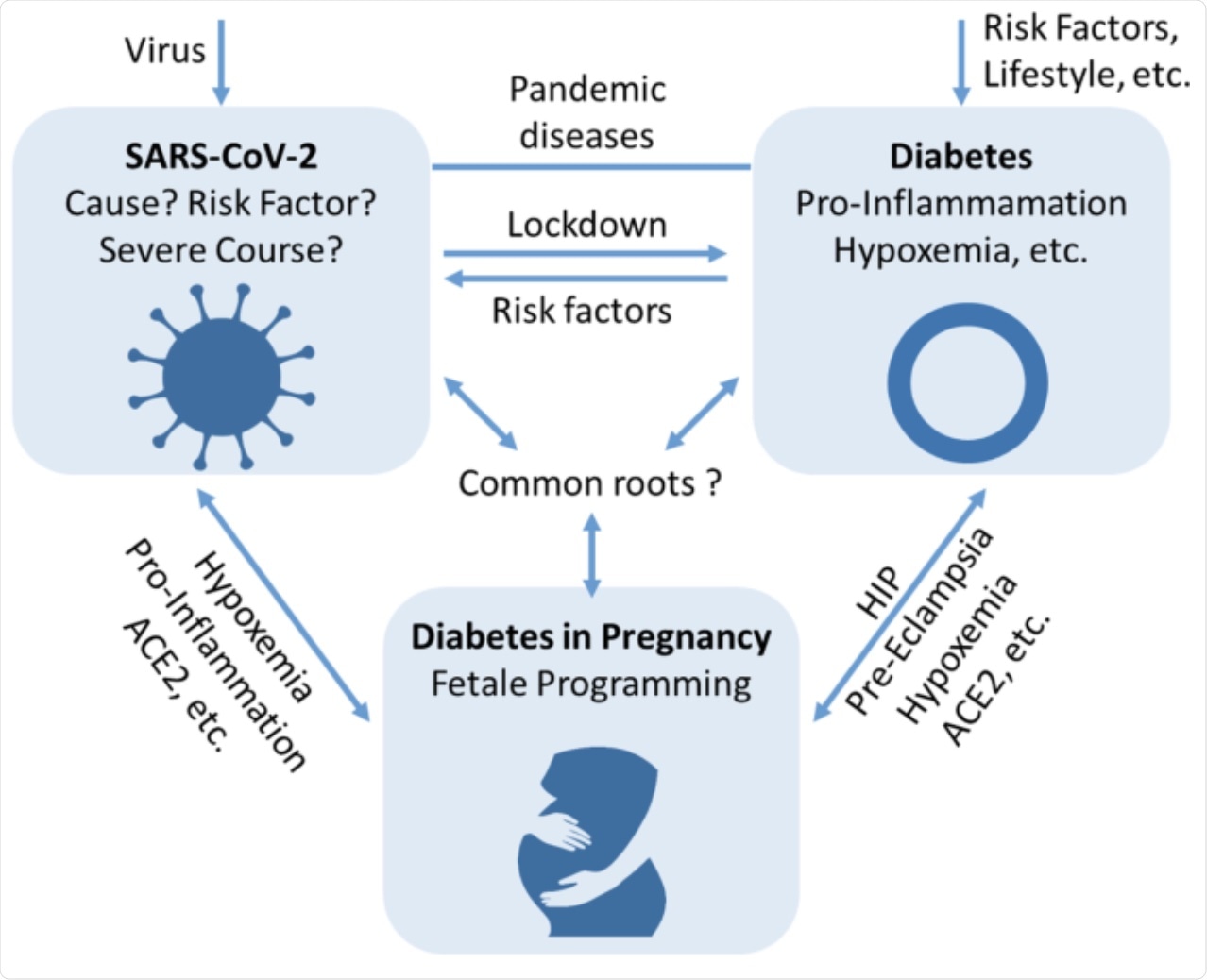An investigation of SARS-CoV-2 infection in diabetic pregnancies

In a new study published in the journal BMC Pregnancy and Childbirth, researchers discuss the basic and clinical science of the potential inter-relationships between diabetes mellitus and coronavirus disease 2019 (COVID-19) in pregnancies.
 Study: SARS-CoV-2 in diabetic pregnancies: a systematic scoping review. Image Credit: Halfpoint / Shutterstock.com
Study: SARS-CoV-2 in diabetic pregnancies: a systematic scoping review. Image Credit: Halfpoint / Shutterstock.com
About the study
Both COVID-19 and diabetes mellitus are pandemic. Increased severity of COVID-19, which is caused by infection with the severe acute respiratory syndrome coronavirus 2 (SARS-CoV-2), has been reported in patients with diabetes mellitus. However, the clinical implications of COVID-19 in diabetic pregnancies are unknown.
To understand this better, the researchers of the current study carried out a systematic scoping review in MEDLINE (PubMed), EMBASE, CINAHL, Cochrane Library, and Web of Science Core Collection in September 2020.
Following PRISMA for systematic reviews and Joanna Briggs Institute for systematic scoping reviews guidelines, the researchers carried out the literature searches on COVID-19 and Diabetes Mellitus (I), COVID-19 and pregnancy (II), and COVID-19 and diabetic pregnancies (III). The researchers were specifically interested in pathophysiological mechanisms, clinical outcomes and features, screening, and management.
The prognosis of pregnant women with diabetes mellitus and COVID-19 may be associated with potential underlying mechanisms, such as a simplified viral uptake by angiotensin-converting enzyme 2 (ACE2), which is the main entry receptor for SARS-CoV-2, a higher basal value of proinflammatory cytokines, being hypoxic as well as platelet activation, embolism, and preeclampsia. COVID-19 may predispose infected individuals to the onset of diabetes mellitus.
SARS-CoV-2 and diabetes
While diabetes mellitus and cardiovascular disease were the most common comorbidities observed in SAR-CoV-2 patients, several studies have reported the incidence of diabetes mellitus to be twice as high in severe cases of COVID-19. Furthermore, diabetic patients with COVID-19 are at a greater risk of intensive care unit admission and a longer stay in the hospital.
The study observed that in COVID-19 patients with diabetes mellitus, there was a higher risk for severe pneumonia, the release of tissue injury enzymes, higher serum levels of inflammation-related biomarkers, altered and weaker immune response, and an increased risk for prothrombotic events.
“Overall, there are clear hints that the prognosis of patients diagnosed with COVID-19 and DM may be associated with a simplified viral uptake by receptor angiotensin-converting enzyme 2 (ACE2), with a higher basal value of proinflammatory cytokines which facilitate a cytokine storm, with being hypoxemic and with elevated levels of IL-6 and AMPK/mTOR signaling pathway.”
SARS-CoV-2 and pregnancy
Current estimates indicate that about 10% of percent of pregnant women are diagnosed with COVID-19. Of these, pre-existing diabetes was associated with severe COVID-19 in pregnancy, rather than gestational diabetes mellitus.
While limited data on maternal, fetal, and neonatal outcomes of pregnant women with SARS-CoV-2 infection are currently available, higher risks of pregnancy complications including preterm birth and preeclampsia exist. High body mass index (BMI) and high maternal age are other risk factors for severe COVID-19 in pregnant women.
Issues such as fever, coughing, fetal distress, delivery by cesarean section, and lymphopenia, to name a few, were found in a small percentage of the women. Notably, the studies reviewed by the authors found no cases of severe pneumonia and maternal death. All infants born from these mothers also had good Apgar Scores. Additionally, the presence of SARS-CoV-2 was not detected in amniotic fluid, breastmilk, umbilical cord blood, and neonatal throat swabs.
Potential mechanisms involved
ACE-2 is expressed in several important metabolic organs and tissues, some of which include pancreatic beta cells, adipose tissue, the small intestine, and kidneys. Therefore, infection with SARS-CoV-2 may lead to alterations of the glucose metabolism, thus complicating the pathophysiology of preexisting diabetes mellitus or lead to other mechanisms such as insulin deficiency and increased risk of diabetic ketoacidosis.
Metabolic imbalances occurring with viral diseases is well known. SARS-CoV-2 damages islets and causes new-onset diabetes mellitus. While there is no current evidence on the role of new diabetes mellitus in pregnant women, it is conceivable that COVID-19 could also trigger gestational diabetes.
Hypoxia triggered by pulmonary inflammation and dysfunction caused by SARS‐CoV‐2 infection is a major clinical outcome in COVID-19 patients. COVID-19 patients with DM were at an increased risk of hypoxemia, which was independently associated with in-hospital mortality.
Hypoxic injury in the placenta and the development of a pre-eclamptic state are associated with the hyper-inflammatory state in COVID-19. Current evidence indicates that preeclampsia may be common in pregnant COVID-19 patients.
 Interplay of SARS-CoV-2, diabetes mellitus, and pregnancy.
Interplay of SARS-CoV-2, diabetes mellitus, and pregnancy.
Severe maternal inflammatory status caused by SARS-CoV-2 can result in inflammation in the placenta. Transmission through the placenta is also observed.
“Therefore, SARS-CoV-2 may cause maternal viremia, placental infection, placental inflammation and neonatal viremia.”
These changes also may cause trans-generational programming, which includes fetal, perinatal, and in utero programming. Taken together, these effects can lead to long-term consequences for the offspring.
Further, looking at the screening and management of COVID-19 in pregnancy, complications imposed due to lockdown restrictions and social distancing measures limit the healthcare, testing, medication, and diet of these pregnant women. These measures can therefore lead to the detection of only high-risk women or the inability to identify gestational diabetes mellitus early on. Digital medicine and care can therefore aid as an innovative tool, involving telemetric interventions or the use of smartphone apps.
Conclusions
Published data on COVID-19 and pregnant women with diabetes mellitus are currently insufficient and knowledge in this field is just emerging. However, the risks of severe COVID-19 for a pregnant diabetic woman are high.
Given the challenges in clinical management, as well as the complex and trans-generational interplay between COVID-19 and diabetic pregnancies, the researchers in this study emphasized the need for evidence-based recommendations.
“We anticipate our review to be a starting point to understand and analyze mechanisms and epidemiology to most effectively treat women with SARS-COV-2 and diabetes in pregnancy.”
- Eberle, C., James-Todd, T. & Stichling, S. (2021). SARS-CoV-2 in diabetic pregnancies: a systematic scoping review. BMC Pregnancy Childbirth 21(573). doi:10.1186/s12884-021-03975-3. https://bmcpregnancychildbirth.biomedcentral.com/articles/10.1186/s12884-021-03975-3.
Posted in: Child Health News | Medical Research News | Women's Health News | Disease/Infection News
Tags: ACE2, Adipose, Amniotic Fluid, Angiotensin, Angiotensin-Converting Enzyme 2, Blood, Body Mass Index, Cardiovascular Disease, Cesarean Section, Childbirth, Coronavirus, Coronavirus Disease COVID-19, Coughing, Cytokine, Cytokines, Diabetes, Diabetes Mellitus, Diabetic Ketoacidosis, Diet, Embolism, Enzyme, Epidemiology, Fever, Gestational Diabetes, Glucose, Glucose Metabolism, Healthcare, Hospital, Hypoxemia, Hypoxia, Immune Response, In Utero, Inflammation, Insulin, Intensive Care, Lymphopenia, Medicine, Metabolism, Mortality, Pandemic, Pathophysiology, Placenta, Platelet, Pneumonia, Pregnancy, Receptor, Respiratory, SARS, SARS-CoV-2, Severe Acute Respiratory, Severe Acute Respiratory Syndrome, Signaling Pathway, Small Intestine, Syndrome, Throat, Umbilical Cord

Written by
Dr. Ramya Dwivedi
Ramya has a Ph.D. in Biotechnology from the National Chemical Laboratories (CSIR-NCL), in Pune. Her work consisted of functionalizing nanoparticles with different molecules of biological interest, studying the reaction system and establishing useful applications.
Source: Read Full Article